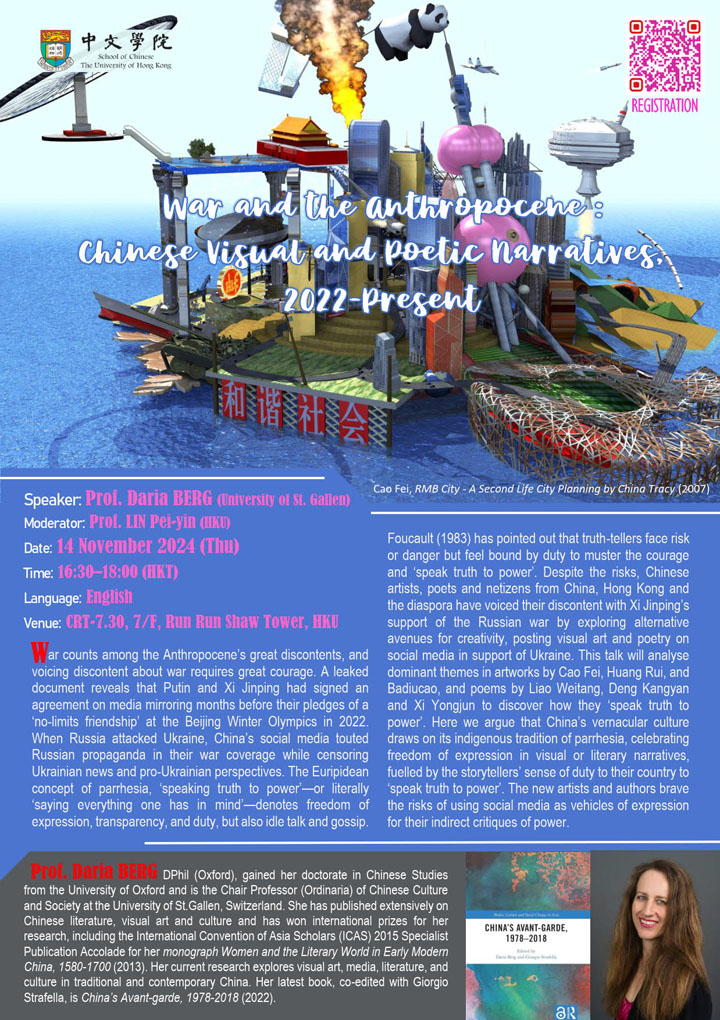War and the Anthropocene: Chinese Visual and Poetic Narratives, 2022-Present

School of Chinese Scholar Seminar
War and the Anthropocene:
Chinese Visual and Poetic Narratives, 2022-Present
https://hku.zoom.us/j/92821392364?pwd=SvUqlf9WI2Uyt5zz0ZbE52TvDlgIpQ.1
Meeting ID: 928 2139 2364
Password: 413109
Abstract:
War counts among the Anthropocene’s great discontents, and voicing discontent about war requires great courage. A leaked document reveals that Putin and Xi Jinping had signed an agreement on media mirroring months before their pledges of a ‘no-limits friendship’ at the Beijing Winter Olympics in 2022. When Russia attacked Ukraine, China’s social media touted Russian propaganda in their war coverage while censoring Ukrainian news and pro-Ukrainian perspectives. The Euripidean concept of parrhesia, ‘speaking truth to power’—or literally ‘saying everything one has in mind’—denotes freedom of expression, transparency, and duty, but also idle talk and gossip. Foucault (1983) has pointed out that truth-tellers face risk or danger but feel bound by duty to muster the courage and ‘speak truth to power’. Despite the risks, Chinese artists, poets and netizens from China, Hong Kong and the diaspora have voiced their discontent with Xi Jinping’s support of the Russian war by exploring alternative avenues for creativity, posting visual art and poetry on social media in support of Ukraine. This talk will analyse dominant themes in artworks by Cao Fei, Huang Rui, and Badiucao, and poems by Liao Weitang, Deng Kangyan and Xi Yongjun to discover how they ‘speak truth to power’. Here we argue that China’s vernacular culture draws on its indigenous tradition of parrhesia, celebrating freedom of expression in visual or literary narratives, fuelled by the storytellers’ sense of duty to their country to ‘speak truth to power’. The new artists and authors brave the risks of using social media as vehicles of expression for their indirect critiques of power.
This study is jointly authored by Daria Berg and Qian Cui.
About the Speaker:
Professor Daria Berg, DPhil (Oxford), gained her doctorate in Chinese Studies from the University of Oxford and is the Chair Professor (Ordinaria) of Chinese Culture and Society at the University of St. Gallen, Switzerland. She has previously taught at the Universities of Oxford, Durham and Nottingham, UK and held a visiting fellowship at Trinity College Cambridge, UK. She has published extensively on Chinese literature, visual art and culture and she has won international prizes for her research, including the International Convention of Asia Scholars (ICAS) 2015 Specialist Publication Accolade for her monograph Women and the Literary World in Early Modern China, 1580-1700 (2013) and, with Giorgio Strafella, the China Information Best Article Prize 2015. Her current research explores visual art, media, literature, and culture in traditional and contemporary China. Her latest book, co-edited with Giorgio Strafella, is China’s Avant-garde, 1978-2018 (2022).








